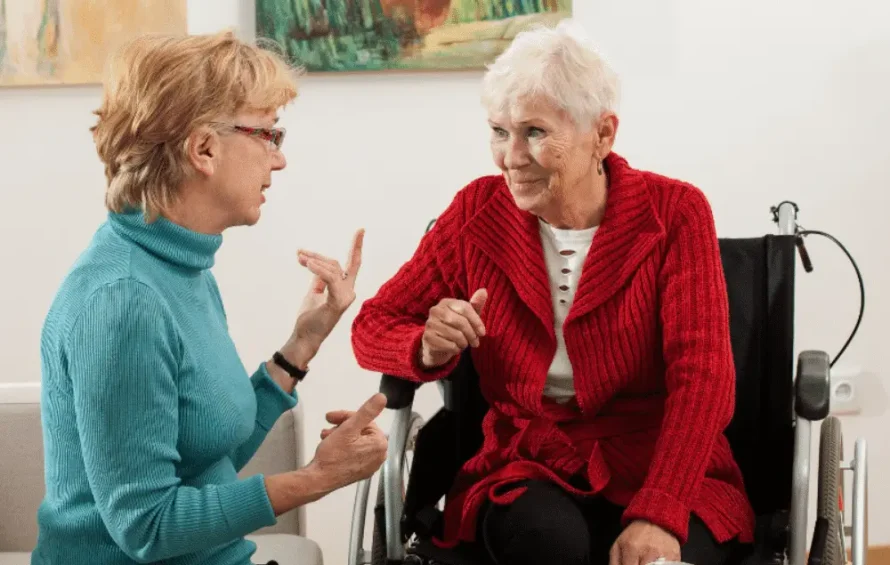
The care advantage
Meeting the needs of those living with profound and multiple learning disabilities
We work alongside families, social care teams, and the wider support network to give those living with profound and multiple learning disabilities the best possible quality of life. We understand that they need round the clock care from compassionate experts, and that many people with severe learning disabilities are often dealing with more than one physical disability as well.
Complex requirements we support include:
We can provide:
The care advantage
How we support people living with learning disabilities
People living with a learning disability experience life in their own way. Some may take longer to learn new skills, others might need extra help to live independently, while someone with severe or profound learning disabilities will need round the clock support.
Where possible, we promote:
We understand that individuals may be managing a combination of learning difficulties and physical disabilities, and we're equipped to help them thrive.

The care advantage
Managing the challenges of living with autism spectrum disorders
It can be difficult for people living with autism to navigate a neurotypical society. There are many desirable characteristics and strengths associated with autism, and it may not be obvious that someone thinks, feels, or processes their thoughts and emotions differently.
We provide specialist services to help people with autism, Asperger's and related conditions to manage and overcome the challenges they face in daily life.
We can help with:


The care advantage
Caring for people with mental health needs
Everyone needs support with their mental health from time to time. We can help people going through a difficult time or those with long-term conditions. Our bespoke care plans are person-centred and help people set and work towards realistic goals as part of their recovery.
Whether it's practical support, help relearning skills or a sympathetic ear to share thoughts and worries with, we'll be there.
Conditions we support include:
The care advantage
Our approach to managing challenging behaviour
We work with people struggling in their everyday lives, those who've been hospitalised in the past, and individuals who display challenging behaviour such as verbal or physical aggression and self-injury.
A person's behaviour can tell us a lot about how they're feeling. We see challenging behaviour as a form of communication and try to get to the root of the issue so we can address it.
We aim to make sure the people we care for have the conditions they need to thrive, which includes:
Ideally, we prefer to reduce physical intervention and psychotropic medications unless it's in the person's best interests or for the safety of others.

The care advantage
Youth services for people aged 16-18
It's really important for young people to have the right support to help them flourish in the community. We provide a safe, nurturing environment where they can develop skills, build confidence, and get the right support for their needs.
We connect them with education and work opportunities, as well as activities to help them live life to the max.
Our youth services are for:
Ideally, we prefer to reduce physical intervention and psychotropic medications unless it's in the person's best interests or for the safety of others.


The care advantage
Comprehensive care for complex conditions
Supported living can be tailored for people living with one or more complex conditions. We take care to thoroughly prepare for our resident's arrival so we can meet their physical, mental, and lifestyle requirements.
This gives people who ca'nt or do'nt want to live at home or in a care home more options, and a safe, supportive environment.
We can support a range of conditions, including:
Ideally, we prefer to reduce physical intervention and psychotropic medications unless it's in the person's best interests or for the safety of others.
The care advantage
Supporting people living with different types of dementia
We understand the different types of dementia and how distressing living with the disease can be. Supported living is an effective way to manage care needs of people living with Alzheimer's, vascular or mixed dementia, or dementia associated with another condition.
Supported living provides a safe, comfortable environment. We can cater for people who need continuous supervision and control under the Deprivation of Liberty Safeguards.
Our team have experience with all types of dementia, including:
Ideally, we prefer to reduce physical intervention and psychotropic medications unless it's in the person's best interests or for the safety of others.


The care advantage
Tailored supported living for sensory impairment
We create a safe environment to help people living with sensory impairment to be as independent as possible. Each home specialises in supporting people living with specific sensory impairments, such as visual impairment, hearing loss, or a combination of both.
Sensory impairment can have a range of causes and impact people at different stages of their life, which is why it's so important to take into account the needs of the individual.










